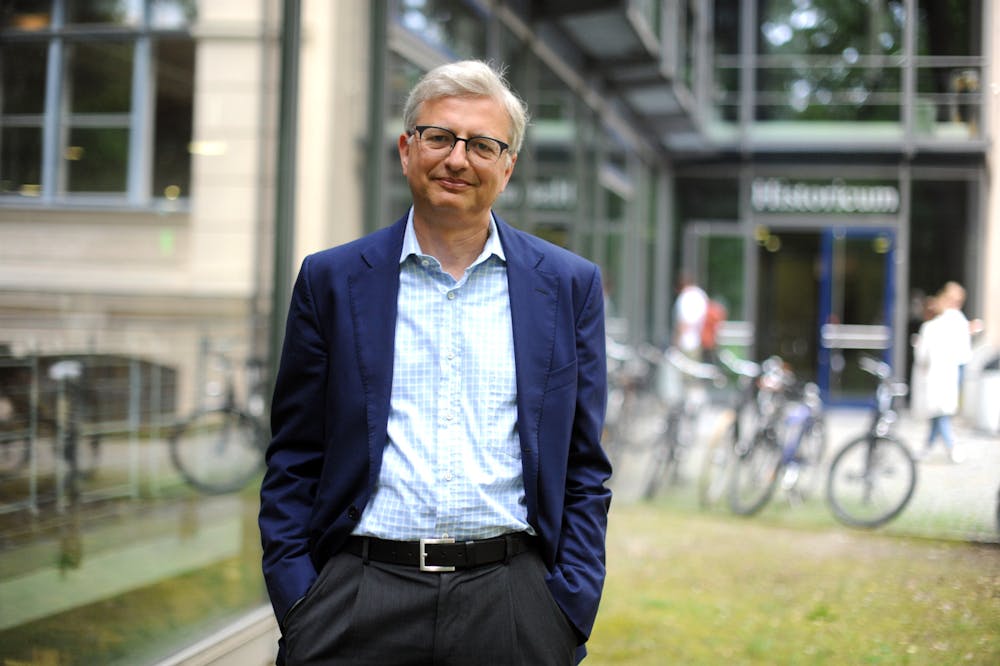The Eagle reported on protests by American University Alums for Palestine that took place on Nov. 15. AU Alums of Palestine protested against the AU Meltzer Schwartzberg Center for Israel Studies conference “Israel at 100: Scenarios for the Future of Israel in 2048” outside Constitution Hall. It seems that none of the protesters and none of the Eagle reporters actually went inside to hear the discussions. They may have noted that the conference was not meant to be and was not a celebration of Israel — but rather a critical evaluation of possible future scenarios by a diversity of invited speakers, among them Palestinians. This conference was neither a glorification of the war nor a legitimation of Israeli politics. In fact, many of the views represented were very clear in their criticism of the Israeli government and expressed deep concern about its future path.
I regret that The Eagle, which prides itself in independent journalism, did not send its staff to report first-hand on the event or speak to any of the participants but decided only to cover the outside protesters. Had they attended, they might have come to similar conclusions as many of the attendees. The attendees agreed with some of the speakers at the conference and strongly disagreed with others. After all, that is the purpose of academic conferences: to bring together a range of different opinions. However, it seems that these days, we only want to hear confirmations of our own views. Thus, we can stay outside and think we know exactly what is happening inside. This raises questions of a deeper nature than the actions of a small group of two dozen protesters, who I believe set up a hostile atmosphere for members of campus. While demanding freedom of expression for themselves, they tried to deny it to others by shouting down, insulting and physically intimidating students and faculty who attended the event. One may also wonder how appropriate it is to yell “KKK fascists” in the face of Black AU Police Department officers.
Our campus, like many universities, has long been drawn into this conflict. There are faculty, staff and students who had family and friends killed, abducted or injured on both sides. There are many of us who deeply care for the lives of the people in the region. We have seen walls going up on campus, friendships torn apart and increasing retreats to our own bubbles. We have seen an inability to reach out and talk to each other, both among students and colleagues. And we have seen a refusal from both sides to recognize the suffering of the other. For some time now, it has been impossible to engage in a meaningful dialogue on campus. I have heard many arguments against such a dialogue, but in my view, there is never a compelling reason why members of the same university should not speak with each other. Like in a family, we can disagree, even strongly so, but we should all try to engage in discussions. Instead of staying with our own flags in our own echo chambers and identifying as pro-Israel or pro-Palestine, let’s perhaps try something else: to reach out and identify as pro-peace and pro-coexistence.
With all the noise of protests, boycotts and threats, one easily forgets that there exist many silent venues to bring people of different opinions together, both in the region itself and on campus. In my direct contacts with Palestinian faculty and students on campus, I always encountered an open-mindedness that their self-declared supporters do not always share. In every Israel-related class, I have Palestinian colleagues on campus who come and present their points of view to my students. In addition, just last week, we had two young Palestinian and Israeli peace activists in class. A few days ago, the Center for Israel Studies brought a Jewish and a Palestinian citizen of Israel on campus who both had lost close family members on Oct. 7, 2023, to talk about the possibilities of a future for both peoples in spite of their suffering. AU students have always been part of this dialogue as well. A few years ago, the Eagle reported about the productive encounter I had with an engaged Palestinian student on campus. Conversations with people of different opinions are not always easy, and it is much simpler to stay in one’s own bubble. But especially in difficult times, it is so important that the voices of dialogue make themselves heard.
Michael Brenner is a Distinguished Professor of History and Director of the Center for Israel Studies.
This article was edited by Alana Parker, Rebeca Samano Arellano and Abigail Turner. Copy editing done by Luna Jinks and Nicole Kariuki. Fact checking done by Luna Jinks and Sasha Dafkova.





